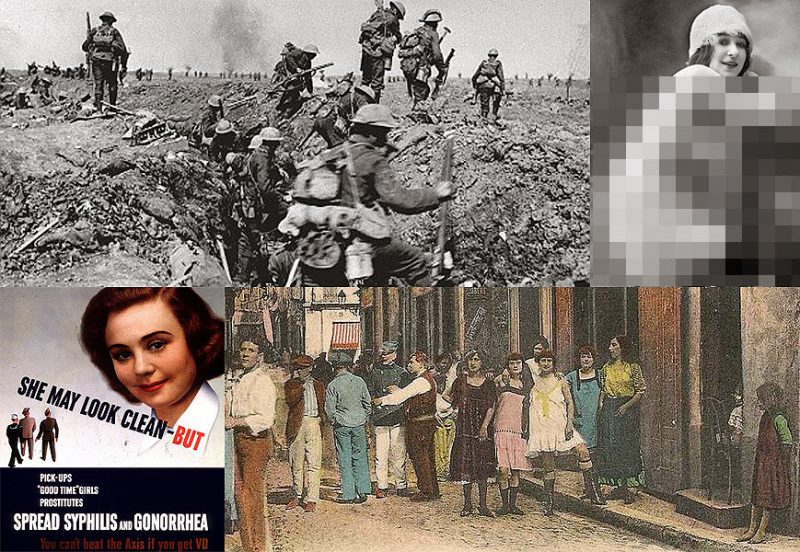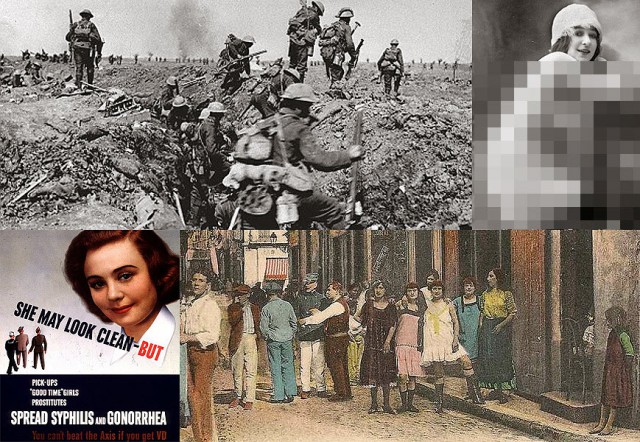Photo story (Clockwise from top left): (1) Allied soldiers during WWI tried to utilize their next few mortal days (2) History of prostitution extends to all modern and ancient cultures (3) There were officially sanctioned brothels in France during WWI; A group of prostitutes in Marseilles, France in 1919 (4) Anti brothel and anti V.D. poster by U.S. government during WWII
Human sexual practice is the behavior in which humans express and experience their sexuality. In many cultures, sexual activity is considered acceptable only within marriage. Prostitution is the practice or business of engaging in sexual activity in exchange for a payment. The history of prostitution extends to all modern and ancient cultures and it has been mentioned as the ‘world’s oldest profession’.
Nothing can unleash sex like war. After all, when a soldier knows that he might die tomorrow, the thing that might pop up in his head is having sex tonight. Since the known history of ancient Roman wars to modern warfare, sex has decided wars and thus changed the world. Seductive spies, porn and even officially sanctioned brothels were used as part of strategy for victory during wars.
Both the World Wars saw the development of middle class and working women who came into major cities to take on war jobs. Many male soldiers were also assigned to the same towns at the same time. For many of these war working women, prostitution became a normal practice in order to supplement their income. In Washington & London, a large number of part time hookers made themselves available to the soldiers and charged very little for their services. One famous sex worker later said ‘took care of the boys who were going overseas. I might have been the last happy moment they had on earth’. The same situation occurred in Rome and Berlin and possibly in Moscow as well.
Until 1946, brothels were legal in France. In 1960, France signed the convention to suppress human trafficking and exploitation of prostitution. U.S. army officials estimated that there were 5,000 professionally licensed prostitutes called streetwalkers, another 70,000 unlicensed prostitutes and 40 major brothels in Paris alone.
Local codes of ethics were adopted by the British army when fighting in another country. And they have allowed soldiers both the young and the married men, who were missing their wives to indulge with sex workers. But the British soldiers always preferred to indulge with armor (condoms). The British soldiers paid 6 pence per day and ended up with lowest paid prostitutes. The soldiers from Dominions (autonomous states under British sovereignty)- Canada, Australia and New Zealand received 6 shillings and could afford higher class prostitutes. There were 12 pence per shilling and 20 shillings per pound.
The British officers also gained strategic and tactical information from the German officers’ former prostitutes during the end of the war while the Allied troops were advancing. Though it is unknown what percentage of men visited the brothels in France during WWI, but the French army recorded a million cases of syphilis and gonorrhea during the war. The rates of venereal disease (VD) increased rapidly. Over 150,000 British troopers had been infected by the end of the WWI. The attitude of U.S. army was driven by a reformist attitude at home.
Instructions from U.S. army and posters, banners, leaflets read lines like ‘You wouldn’t use another person’s toothbrush, then why use his whore?’ There were strict rules for U.S. soldiers to submit chemical prophylaxis reports whoever admitted to having sex while on leave. Soldiers who did not do so and were later contracted VD were subject to court martial that sentenced them to hard labor.
A proposal of French president to resolve a brothel related dispute read that American medical authorities would control brothels designated solely for American troopers. U.S. Secretary Baker said upon receiving the proposal ‘For God’s sake, don’t show this to the president or he will stop the war’. Such conservative views regarding exposing soldiers to the prostitutes were possessed by the U.S. president during the WWI.
Web edition of eminent British daily tabloid news paper The Daily Mail reported on the officially sanctioned brothels in France during WWI.
Corporal Jack Wood probably never imagined that he was about to shed yet more of his innocence when he was given a few hours of leave from fighting on the Western front. He had arrived France only recently but had already witnessed enemy fire and been exposed to enemy shelling. He had waded through the muddy trenches, felt rats scuttle over him and lice crawl across his body as he slept on the Front when exhausted.
Yet another shock awaited him as he strolled through the streets of nearby town. It was a brothel. Wood wrote in his diary ‘We had heard about the renowned Red Lamp with a number 3 on it, but never thought of the reality of it. I shall never forget my first view’.
A great crowd of fellows were waiting there. The lamp was lit at about five minutes to six. The door opened at six and the crush to get in commenced. The establishment marked by red lamp was one of the legendary maisons tolerees or legalized brothels in northern France. Professional prostitutes under the discipline of a madame were housed in these and their regular medical inspections were carried out. By 1917, at least 137 such brothels spread across 35 towns.
Other than these establishments, vast numbers of amateur sex workers also practiced their trade in hotels, streets, bars and cafes. One study by British medical officers in Le Havre in the north-western France suggested that in 1915 alone, they counted 171,000 visitors to the brothels in just one street in the town.
The subject tended to be shrouded in secrecy. But a few personal accounts were found through diaries, letters, interviews and memoirs. Their descriptions suggest that mixing with the ladies of the night was commonplace. The French thought nothing of permitting their soldiers to use brothels. The British authority therefore, did not want to offend their allies and also allowed the local customs for their soldiers.
However, many in British authorities did not agree with such liberal measures. Lord Kitchener, the Secretary of State for War, provided each soldiers with leaflet that read ‘You may find temptations in both women and wine but you must entirely resist both.’
The brothels, along with bars and cafes, provided the soldiers with an escape from the filth and slaughter of the trenches. They were warm and bright, jovial and light. And they always had plenty of women to choose from.
Corporal Wood described the scene inside officially sanctioned brothels in France during WWI. ‘There were 7 young women from 28 to 40, made up in the finest flimsy silk dresses and then showing delicate lingerie for attraction. Madame stood taking a franc for admission and afterwards I found out you paid the lady of choice any sum from a franc upwards.’ Some visitors were shocked what they had found and left within seconds.
Private Eddie Bigwood had just been assigned to a battalion that suffered severe casualties during the first battle of Somme. They stopped in Rouen in northern France and went to town for some recreation. Soon they moved onto a brothel but left immediately when five naked girls came down dashing.
William Roworth, a young Private who joined army when he was 3 years under the minimum recruiting age, lost his virginity to a ‘dirty looking girl’ at one brothel soon after he had arrived France. He explained that the pleasure was minimal as there weren’t much conversation.
Lieutenant R. Graham Dixon spent the final year of the warfare on the Western Front. When he went to Dunkirk in northern France, he always visited a particular black eyed, black haired & enthusiastic prostitute at a particular brothel.
The soldiers did not know when they might be killed in the battle. One in ten British soldiers in France and Flanders was killed in the war. During the bloodiest phase, a junior officer had six weeks to live on an average. They tried to utilize their next few mortal days.
One of them was Lieutenant James Butlin. He spent a few days in Rouen before returning to the front for the final time. He said that the town had been ‘ruinous to my purse, not to mention my morals’. ‘I decided quickly that life must be enjoyed to the full’ he added.
Captain Robert Graves mentioned the younger recruits in his famous autobiography ‘Goodbye To All That’. He wrote ‘they did not want to die virgins’. Bert Chaney, an 18 year old Private was intrigued by a queue at Bethune. One man in the line told him ‘these places were not for young lads like me, but for married men who were missing their wives.’
Private Percy Clare recalled similar advice given by his Brigade Chaplain in which he ‘excused unfaithfulness to our wives in the present circumstances while away from home’. It was also widely believed during the era that for men’s physical health, regular sex was necessary.
17 year old Second Lieutenant Dennis Wheatley received a handsome commission and he spent at one of the most luxurious brothels in France reserved for officers. He described his time with ‘a pretty little blonde’ in an eight sided room which had its wall and ceilings entirely covered with mirrors. Wheatley was gassed in a chlorine attack at Passchendaele and was forced out of military due to the illness after service in Flanders. He later went on to become a well-known author.
Besides momentary release from the war, a brothel visit also bought men a long lasting legacy in the form of venereal diseases. Each army unit had a treatment station where the soldiers could get mercury and chlorine ointment to prevent infection, or receive a urethral irrigation with potassium permanganate after exposure. But some soldiers avoided precautions as they deliberately wanted to get infected with gonorrhea and syphilis to win a respite from the trenches being hospitalized for at least 30 days.
This was an attractive option that helped prostitutes with venereal diseases earn more money than an uninfected one. To get infected and thus escaping the carnage of the front line was the main reason of visiting brothels for many men. Wartime prostitution is still little discussed by the veterans perhaps in anticipation of outsiders’ condemnation.
But Private Clare, who prided himself of writing a ‘faithful’ account on the soldiers’ lives in France, mentioned that it was better to know the truth. ‘Feel not disgust dear reader, nor think too hardly of them, I know all their circumstances, what they have borne, what they have yet to bear, can’t find it in me to condemn them, and you have no right to’.
Although the focus was on the soldiers who visited prostitutes, we should wonder what happened to the poor women who were used in this way during the war.
http://www.youtube.com/watch?v=Fqa93eBQRhU
Video story: History Channel documentary on how sex changed the world- sex and the war.

